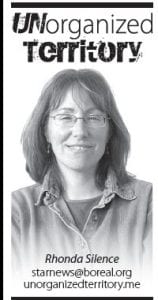After I wrote an Unorganized Territory column recalling the fight to allow 18-year-olds to vote, my son Ben asked an interesting question. He asked why I hadn’t gone into more detail about the struggle women went through to gain the right to vote. The question surprised me for several reasons.
First, I have to admit I was pleased to know that he had read my column. I don’t get a lot of feedback from my immediate family on my weekly compositions. They generally take a quick look to make sure I didn’t talk about them and move on. So it was nice to know that he had taken a few minutes to read and think about what I had to say.
I also have to admit that I was a little surprised that he had remembered what he had learned in history class about women’s voting rights. Neither of my boys liked school much, so I’m surprised any history was retained. Good job, Mrs. Brandt—some of your hard work stuck!
And I was pleasantly surprised that he cared about the issue at all. I was outnumbered in our house when my boys were growing up—we even had a male dog—so there wasn’t a lot of talk around the kitchen table about women’s suffrage. Dinner conversations often focused on BMX bikes, Teenage Mutant Ninja Turtles, Transformers, wrestling, football or some other macho topic.
I did insist that there was no such thing as “women’s work” like doing dishes, making beds or cooking. They learned to do all those things—even if they would have their wives believe differently now. But I don’t recall ever having a conversation about the struggle women faced in the 1800 -1900s.
I think perhaps the reason women’s rights are now more interesting is because Ben is now the father of a daughter. Becoming a parent makes a person grow up a bit. I remember marveling at the change from the rowdy teenager who wrecked his pickup truck within three days of getting his driver’s license to the concerned dad who was freaked out by the traffic speeding past his house. When traffic was detoured down his street during construction of the new Gunflint Trail, the former speed demon took a can of spray paint and wrote in big orange letters in the middle of the road, “Slow Down!”
So, just as being a parent makes you worry about things you never before thought to worry about, being a dad to a daughter brings its own concerns. I’ve overheard amazing conversations between both of my boys and their daughters. My younger son is definitely outnumbered in his house by his wife and three girls!
I have heard debates over ear piercing and nail polish and whether Barbie is a good role model. I’ve heard discussion of which Disney Princess is the prettiest, kindest or strongest. I’ve heard lots of silly threats about what will happen to future boyfriends.
And happily, I’ve seen that my granddaughters are being raised to be strong-willed, independent women who will follow in the footsteps of those pioneering women who fought to have a say in the governing of our country. Women like Susan B. Anthony, perhaps the most well known suffragist. Working with Elizabeth Cady Stanton, she founded the American Equal Rights Association, which fought for equal rights for both women and African Americans. The women published their own newspaper in 1868—The Revolution—which focused on women’s rights.
I hope my granddaughters learn about Anthony, who in 1872, was arrested for voting in her hometown of Rochester, New York. She was tried and convicted in a widely publicized trial which only served to gain sympathy for the women’s movement, although it was many years later before women gained the right to vote.
In 1878, Anthony and Stanton were finally able to get Congress to consider an amendment giving women that right. But it took many more years to pass the 19th Amendment and many more women led the way, facing isolation, hostility and downright torture. Women such as Alice Paul and Lucy Burns who were imprisoned for picketing outside the White House during the presidency of Woodrow Wilson, silently calling for equal rights. The women endured inhumane treatment in prison and persevered. Lucy Burns was the first woman to address Congress in 1914 in another attempt to see the 19th Amendment passed.
There were many others who fought loudly—or quietly—like Jane Addams, the first woman to win the Nobel Peace Prize in 1931, who supported the women’s suffrage movement while working to find solutions to society’s ills. Addams is considered to be the founder of the modern day field of social work. There was Nina Allender, an artist—and cartoonist— who put her talents to work to campaign for women’s suffrage with her pen. Others fought for the abolition of slavery and women’s rights through music, such as Julia Ward Howe who wrote The Battle Hymn of the Republic.
Unfortunately Susan B. Anthony did not live long enough to see the ratification of the 19th Amendment on August 18, 1920. She knew though, that the amendment would pass. When she died in March 1906, women had achieved suffrage in Wyoming, Utah, Colorado and Idaho. The tide was turning and it was apparent the fire she had ignited would not burn out.
Thanks Ben for the reminder of the powerful women who shaped our nation. I’ll remember them when I fill out my ballot—and I’ll look forward to the day when my granddaughters are also able to make their voices heard.
Because I am a woman, I must make unusual efforts to succeed. If I fail, no one will say, “She doesn’t have what it takes.” They will say, “Women don’t have what it takes.”
Clare Boothe Luce



Loading Comments